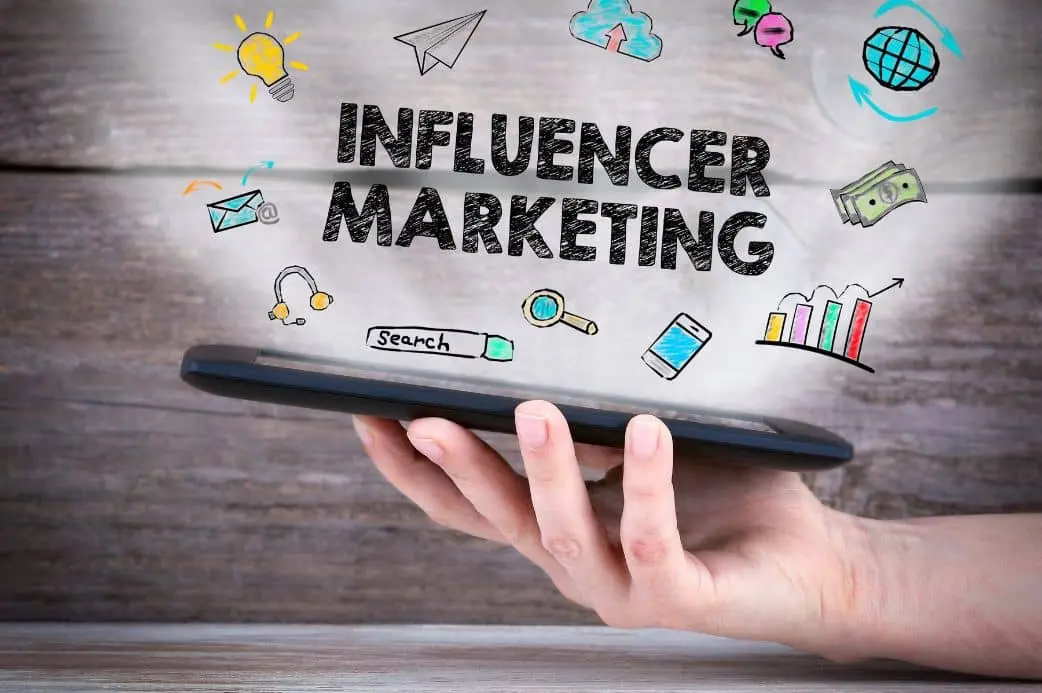In today’s digital age, where social media has become an integral part of our lives, influencer marketing has emerged as a powerful tool for brands to reach and engage their target audience. But what exactly is influencer marketing? How can it benefit your brand? And how can you navigate the complex world of influencers to create successful campaigns? This article will provide you with a comprehensive guide to influencer marketing and how it can unlock success for your brand.
What is influencer marketing?
Influencer marketing is a strategic strategy that entails partnering with noteworthy individuals, referred to as influencers, to endorse your brand, merchandise, or services to their dedicated followers. These influencers have cultivated a robust online presence and possess the capacity to influence the viewpoints and buying choices of their audience. Frequently, they are authorities or passionate individuals in a specific domain, such as fashion, beauty, wellness, or travel.
The power of influencers in the digital age
Influencers have become powerful voices in the digital age, with their ability to connect and engage with their audience on a personal level. Unlike traditional advertising, which can feel intrusive and impersonal, influencer marketing allows brands to tap into the trust and authenticity that influencers have established with their followers. When an influencer recommends a product or shares their experience with a brand, it is seen as a genuine endorsement rather than a paid advertisement.
Benefits of influencer marketing
Incorporating influencer marketing into your comprehensive marketing approach offers a multitude of advantages. Initially, it enables you to connect with an exceptionally focused audience. Through collaborations with influencers in your field, you can guarantee that your communication reaches individuals who are more prone to find your brand or products appealing. This precision-focused method can result in elevated conversion rates and a more substantial return on your investment.
In addition, influencer marketing contributes to the establishment of brand recognition and trustworthiness. As influencers endorse your brand, their followers are inclined to extend their trust and esteem towards your brand too. This can result in an increase in brand loyalty and an expanded customer base. Additionally, influencer marketing can help you generate valuable user-generated content, as influencers often create high-quality, engaging content that can be shared across various platforms.
How does influencer marketing work?
Influencer marketing involves a collaborative partnership between a brand and an influencer. The first step is to identify the right influencers for your brand. Look for influencers who align with your brand values, have a large and engaged following, and create high-quality content. Once you have identified potential influencers, reach out to them with a personalized pitch explaining why you believe they would be a good fit for your brand.
Once you have established a partnership with an influencer, it’s essential to define the goals and objectives of your influencer marketing campaign. Do you want to increase brand awareness, drive traffic to your website, or boost sales? Clearly communicating your goals will help both you and the influencer to create content that aligns with your objectives.
Finding the right influencers for your brand
Finding the right influencers for your brand can be a daunting task, considering the vast number of influencers available across various social media platforms. To find the perfect match, start by researching influencers in your niche. Look for influencers who have a genuine connection with their audience and create content that resonates with your target market.
There are also several influencer marketing platforms and tools available that can help you identify and connect with influencers. These platforms provide valuable insights into an influencer’s reach, engagement rates, and audience demographics, making it easier for you to make informed decisions.
Establishing a successful influencer marketing campaign
To ensure a successful influencer marketing campaign, it is crucial to establish clear expectations and guidelines for both the brand and the influencer. Clearly communicate your expectations regarding the type of content, posting frequency, and any specific messaging you want the influencer to convey. However, it’s also essential to give influencers creative freedom so that their content remains authentic and resonates with their audience.
Collaboration is key in influencer marketing. Work closely with the influencer to develop a content strategy that aligns with your brand goals. Provide them with the necessary resources, such as high-quality images or product samples, to create compelling content. Regularly monitor the campaign’s progress and provide feedback to ensure that it is on track.
Dos and don’ts of influencer marketing
While influencer marketing can be highly effective, there are certain dos and don’ts that brands should keep in mind. Firstly, do your research and choose influencers who genuinely align with your brand values and have an engaged following. Avoid partnering with influencers who have been involved in controversies or have a history of unethical practices.
It’s also essential to disclose sponsored content and collaborations. Transparency is key in influencer marketing, and failing to disclose sponsored posts can not only damage your brand’s reputation but also violate advertising guidelines. Make sure that influencers clearly disclose their partnership with your brand, whether it’s through hashtags such as #ad or #sponsored or through explicit statements.
Measuring the success of influencer marketing
Measuring the success of your influencer marketing campaigns is crucial to understand the return on investment and make informed decisions for future campaigns. There are several key metrics that you can track, such as reach, engagement, website traffic, and conversion rates. Use tools like Google Analytics or social media analytics platforms to gather data and analyze the performance of your campaigns.
It’s important to set specific goals and objectives for each campaign and track the relevant metrics accordingly. For example, if your goal is to increase brand awareness, track metrics such as reach and impressions. If your goal is to drive sales, track metrics such as click-through rates and conversion rates. Regularly review and analyze the data to identify trends and areas for improvement.
Tools and platforms for managing influencer marketing campaigns
Managing influencer marketing campaigns can be time-consuming and complex, especially when working with multiple influencers across various platforms. Fortunately, there are several tools and platforms available that can streamline the process and help you manage your campaigns more efficiently.
Influencer marketing platforms such as AspireIQ, Upfluence, and Tribe Dynamics provide features like influencer discovery, campaign management, and performance tracking. These platforms often have built-in analytics and reporting tools that allow you to measure the success of your campaigns and track the performance of individual influencers.
The future of influencer marketing
As social media continues to evolve, so does influencer marketing. The future of influencer marketing lies in the rise of micro-influencers and the use of emerging platforms. Micro-influencers, with their smaller but highly engaged following, offer brands the opportunity to connect with niche audiences in a more authentic way. Emerging platforms like TikTok and Clubhouse are also gaining popularity and present new avenues for brands to reach and engage their target audience.
Influencer marketing is here to stay, but it’s essential to adapt to the changing landscape and stay ahead of the curve. Keep a close eye on emerging trends and platforms, and be open to experimenting with new strategies and approaches.
Read other useful content: What is Digital Marketing
Conclusion
Influencer marketing has proven to be a powerful tool for brands to unlock success in the digital age. By collaborating with influential individuals, brands can reach a highly targeted audience, build brand awareness, and generate valuable user-generated content. However, it is essential to approach influencer marketing strategically, finding the right influencers, setting clear goals, and measuring the success of your campaigns. With the right approach and careful planning, influencer marketing can take your brand to new heights in the digital landscape.
FAQs on Influencer Marketing
1. What is Influencer Marketing?
Influencer marketing involves collaborating with individuals who have a significant and engaged following on social media platforms to promote products, services, or brands.
2. How does Influencer Marketing work?
Influencer marketing works by identifying influencers relevant to your target audience, establishing partnerships, and having them create and share content that showcases your brand or products.
3. Why is Influencer Marketing effective?
Influencer marketing is effective because influencers have built trust and credibility with their followers, leading to higher engagement and conversions compared to traditional advertising.
4. What platforms are commonly used for Influencer Marketing?
Common platforms for influencer marketing include Instagram, YouTube, TikTok, and Twitter, although it can extend to blogs and other social media platforms.
5. How do I choose the right influencers for my campaign?
Choosing the right influencers involves considering factors such as their niche, audience demographics, engagement rates, and alignment with your brand values.
6. What are micro-influencers?
Micro-influencers are individuals with smaller follower counts (typically between 1,000 to 100,000 followers) who have highly engaged and loyal audiences within a specific niche.
7. What is the process of setting up an influencer campaign?
Setting up an influencer campaign involves defining goals, identifying influencers, negotiating terms, creating a content strategy, reviewing and approving content, and measuring the campaign’s success.
8. How are influencers compensated?
Influencers can be compensated through monetary payments, free products, affiliate commissions, or a combination of these, depending on the campaign’s goals and the influencer’s preferences.
9. What are some best practices for a successful influencer campaign?
Best practices include establishing clear expectations, allowing creative freedom for influencers, ensuring transparency, disclosing partnerships, and tracking key performance indicators (KPIs).
10. How can I measure the ROI of an influencer campaign?
You can measure ROI by tracking metrics such as engagement rates, website traffic, conversions, sales, and the overall increase in brand awareness attributed to the campaign.
11. How do I ensure authenticity in influencer partnerships?
Authenticity is ensured by partnering with influencers whose values align with your brand, allowing them creative control, and promoting genuine product experiences rather than scripted endorsements.
12. Are there any potential challenges with influencer marketing?
Challenges include fake influencers, maintaining consistent messaging, finding the right influencers, potential controversies, and staying updated with evolving platform algorithms.
13. Is influencer marketing suitable for all businesses?
Influencer marketing can be beneficial for various businesses, but its suitability depends on factors such as target audience, marketing goals, and available budget.
14. How has influencer marketing evolved over the years?
Influencer marketing has evolved from simple product placements to more authentic, storytelling-driven content, and from celebrity endorsements to collaborations with micro-influencers.
15. What legal considerations are associated with influencer marketing?
Legal considerations include proper disclosure of paid partnerships, adhering to advertising regulations, and respecting copyright and intellectual property rights.
16. Can B2B businesses benefit from influencer marketing?
Yes, B2B businesses can benefit by partnering with industry experts, thought leaders, or influencers within their niche to showcase expertise, credibility, and products/services.
17. How do I find influencers in a specific niche?
You can find influencers by using influencer discovery tools, researching relevant hashtags, exploring industry events, and engaging in social media conversations within the niche.
18. What is the future outlook for influencer marketing?
The future of influencer marketing involves more focus on authenticity, long-term partnerships, video content, data-driven strategies, and increased scrutiny on follower authenticity.
19. Can I run influencer marketing campaigns in-house?
Yes, you can run influencer marketing campaigns in-house by building relationships with influencers directly, managing content creation, and measuring campaign performance.
20. How do global influencer campaigns work across different languages and cultures?
Global campaigns involve working with influencers who are familiar with the target region’s culture and language, ensuring content is culturally sensitive and resonates with the local audience.











